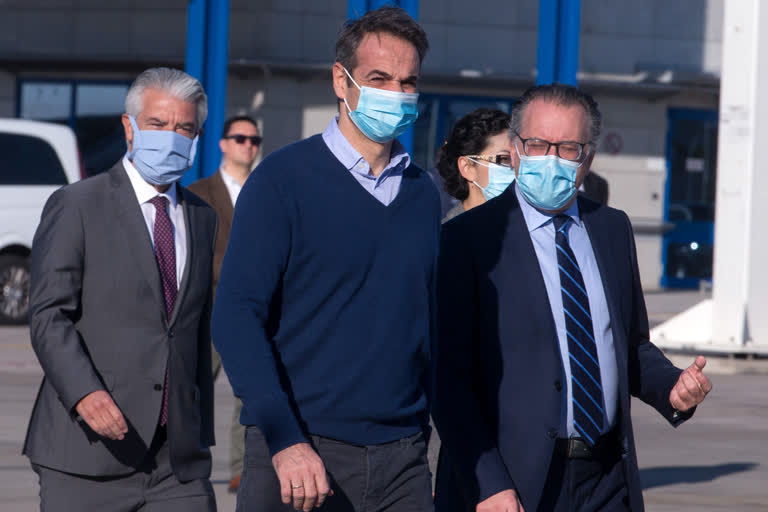Hyderabad: Even as the world struggles with the COVID-19 crisis, there are many unanswered questions about the future. One of these questions is about the impact of the pandemic on international relations and geopolitical trends. Will the fight with a common enemy lead to a new global order and greater international cooperation than we have seen in the recent past?
The answer, unfortunately, is that not much will change for the better. We are likely to see an acceleration of the geopolitical trends that have been visible in the last decade. Globalization was already under pressure with the rise of nationalism and 'nation first' policies. Borders were shutting down and have now been completely sealed, with little prospects of opening up in the near future. This could have a significant impact on migrants, those fleeing wars and violence, as well as those seeking better economic opportunities in developed countries.
Multilateral and international organisations like the United Nations had been weakened due to unilateral actions of major powers and could now lose what is left of their influence. The freezing of funds by the U.S. to WHO is only one more step in a series of actions that included the U.S. pulling out of the Paris Climate Agreement, exiting from UNESCO, and Russians withdrawing from the International Criminal Court. China had refused to cooperate with a U.N. Tribunal and rejected its 2016 ruling on the South China Sea. Even a robust economic union like the E.U. has been found wanting in its response to assisting member states like Italy.
In the last few years, there has been a lively debate on whether liberalism, as a theory of international relations, was on a dying path. Democracy, international institutions, and economic interdependence, all of which serve to make the world more peaceful, were under stress. The realist theory, on the other hand, sees the international system as anarchic, with sovereign states as primary actors. In the absence of a global authority, states are continually seeking to maximize their power.
As we look around the world today and attempt to peer into the post-COVID future, it is apparent that power struggles, both at the regional and global levels, are set to intensify. The severe economic impact of falling oil prices could weaken countries like Iran and Iraq and lead to greater instability in the region. This could also give a fillip to terrorism and greater radicalization, particularly in countries where poor state of health infrastructure cannot handle the debilitating impact of the virus.
Read: As world battles COVID-19, ceasefire violations along LoC
Great power rivalry will deepen. We have already seen a war of words with President Trump accusing China of covering up information about the virus and warning it of consequences if it was “knowingly responsible” for the pandemic. On its part, China has launched a massive propaganda campaign to showcase its success in controlling the virus and is attempting to bolster its soft power by providing medical assistance to countries in Europe, Africa, and Asia.
It has often been said that U.S.-China relations will define the 21st Century. The coronavirus has brought these relations to their lowest point. In an interview with CNBC, James Crabtree, an associate professor at Singapore’s Lee Kuan Yew School of Public Policy, described U.S.-China relations as being "at their worst point in living memory for a number of decades probably since the 1970s."
However, even as the U.S. and China take aim at each other, neither of these two countries has inspired much confidence around the world. The U.S. has failed to take a leadership role during the crisis, and its handling of the pandemic within its borders has been seen as hesitant and uncertain. Much of the world is also not buying the Chinese narrative of its success, and many experts are questioning the coronavirus data put out by the Chinese government.
With all the countries economically weakened and in the absence of global cooperation, the world could slide towards greater multipolarity. Countries like India, which have managed the pandemic relatively effectively, could find themselves in an advantageous position to seize opportunities.
Read: Balakot, a year on: India's achievements and lessons for the future
One such area is manufacturing. The world has realized the dangers of over-reliance of China in global supply chains, and it is quite certain that some manufacturing will shift out of China. Japan has already earmarked $2.2 billion to move production out of China, and many global firms could follow suit, although an immediate exodus is unlikely. It has been reported that around 1,000 firms are engaged in discussions with Indian authorities to set up manufacturing hubs. Many policy changes and incentives will have to be put in place, but a manufacturing shift of this magnitude could be an economic game-changer.
The geopolitical future of the world does not appear to be benign. The French foreign minister gave an accurate description to Le Monde newspaper when he stated, "It seems to me that we are witnessing an amplification of the fractures that have been undermining the international order for years. The pandemic is the continuation, by different means, of the struggle between powers. My fear is that the world after (the outbreak) will strongly resemble the world before, but worse."
Many voices point out to the horrific scale of the unfolding human tragedy and call for setting aside our national differences in order to combat this crisis unitedly. This is a sensible suggestion, but the reality is that moral and ethical considerations have rarely intruded into a state’s struggle for self-preservation and power.
(Lt Gen D S Hooda is the former General Officer Commanding-in-Chief of the Indian army's Northern Command. He had led the surgical strike in 2016)



